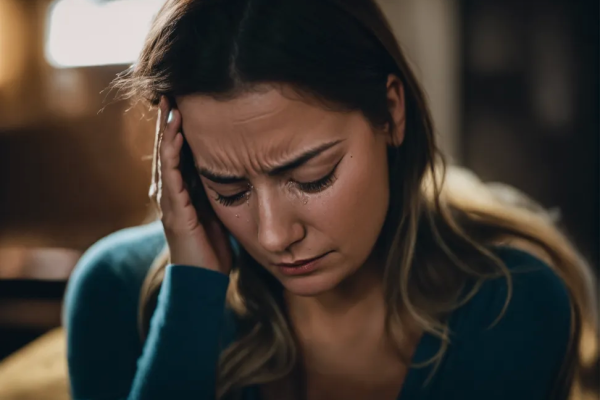
Anxiety disorders are among the most common mental health issues, affecting over 40 million adults in the United States alone. Symptoms like excessive worrying, muscle tension, fatigue, irritability, and sleep difficulties can greatly reduce one’s quality of life. While medication and therapy remain viable options, lifestyle changes offer a safe complementary approach to managing anxiety. Through healthy daily habits and routines, individuals can mitigate distressing thoughts and feelings of panic.
Understanding the Causes and Triggers of Anxiety
The underlying reasons for anxiety differ between individuals. Traumatic life events, genetics, brain chemistry imbalances, and high-stress environments can all contribute to chronic apprehension. Pinpointing your specific triggers is an integral first step toward prevention. Monitor when symptoms manifest to determine if consistent triggers exist. Common external triggers include work pressures, financial issues, major life changes, and relationship problems. Internal triggers like negative thought patterns, poor self-image, stressful memories, and physical factors such as diet, lack of sleep, underlying health conditions may also elicit anxiety.
External Triggers of Anxiety
Situational triggers originate from stressful incidents in one’s surroundings. These can include:
# Work Stress
– Heavy workloads
– Intimidating coworkers/managers
– Job insecurity
– Lack of support
# Financial Issues
– Debt
– Low income
– High cost of living
– Poor money management skills
# Major Life Changes
– Divorce
– Moving
– Changing jobs
– Loss of a loved one
– Having a baby
# Relationship Problems
– Frequent conflicts
– Domestic abuse
– Trust issues
– Being overly dependent
Internal Triggers of Anxiety
Internal triggers stem from within one’s own mind and body. These include:
# Negative Thought Patterns
– Worrying excessively
– Predicting the worst case scenario
– Overanalyzing
– Self-criticism and doubt
# Poor Self-Image
– Low self-esteem
– Lack of confidence
– Feeling like a failure
# Stressful Memories
– Past traumas like abuse, accidents, grief, etc.
– Fear of events reoccurring
# Physical Factors
– Poor diet and hydration
– Insufficient sleep
– Underlying health issues
– Substance abuse
– Hormonal changes
Lifestyle Changes That Can Lessen Anxiety
While some anxiety triggers are unavoidable, nurturing healthy lifestyle habits equips individuals to cope better emotionally. Set yourself up for success by integrating positive routines into your daily life.
Exercise Regularly
– Helps relieve muscle tension and pent-up worries through productive physical outlet
– Boosts mood through release of endorphins
– Enhances sleep
– Supports brain growth and development
Aim for 30-60 minutes of moderate exercise at least 3-5 days per week, whether it be brisk walking, swimming, cycling, aerobics classes, strength training, etc.
# Start An Exercise Routine You Enjoy
Choose workouts you find fun and energizing based on your unique interests, fitness level, schedule, and access to amenities. Whether it’s running, boxing, dancing, weight lifting, yoga, team sports, or exercising at home, find something sustainable. Consider exercising with friends or trying group classes which encourage accountability.
# Set Manageable Fitness Goals
Establish realistic goals that gradually increase your duration, frequency, or intensity without overexertion. Customize an exercise plan that fits your present state of health and lifestyle. Assign yourself rewards for small milestones reached to stay motivated. Apps like MyFitnessPal help conveniently track progress.
# Pick Convenient Times And Locations
Integrate physical activities seamlessly into your regular routine at naturally convenient intervals. For example, go swimming on lunch break, walk or bike to work, do bodyweight exercises during TV commercials, etc. Exercising first thing in the morning also undercuts anxiety before it surfaces later in the day.
Adopt Relaxation Practices
Actively calming one’s mind and body through relaxation techniques counters anxiety’s sensations of restlessness and dread. These can be practiced daily or whenever symptoms flare up.
# Deep Breathing
– Inhale deeply then exhale slowly
– Repeat for 5-10 minutes focusing on controlled breathing
– Directs awareness inwardly toward the body instead of stressful thoughts
# Progressive Muscle Relaxation
– Tense then relax each muscle group individually
– Reduces muscle tension from chronic stress
– Apps provide guidance on technique
# Meditation
– Observe passing thoughts non-judgmentally without attachment
– Promotes metacognition and self-awareness
– Mobile apps teach beginner-friendly meditation
# Guided Imagery
– Mentally envision peaceful images like nature, childhood memories
– Encourages positive thinking patterns
– Recordings talk you through the visualization process
# Mindfulness
– Practice intentionally tuning into the present moment
– Cultivate acceptance and gratitude for what is rather than striving
Optimize Sleep Habits
With anxiety and fatigue intrinsically linked, high-quality sleep minimizes distress and enhances daytime energy and mood. Adults should aim for a full 7-9 hours per night. Prioritizing uninterrupted rest bolsters physical vitality to tackle challenges.
# Establish Consistent Sleeping/Waking Times
Follow the same bedtime and rise time including weekends to reinforce the body’s circadian rhythm so drowsiness hits at the ideal intervals. Making sleep non-negotiable prevents compromising its replenishing effects.
# Limit Blue Light Exposure Before Bed
TVs, phones, tablets emit blue light that inhibits production of the sleep hormone melatonin. Avoid screens 2 hours before bedtime and adjust device settings toward warmer, dimmer lighting at dusk.
# Ensure Proper Sleep Environment
Introduce total darkness, comfortable temperatures, fresh air circulation, and a supportive mattress and pillows. Consider using a white noise machine or ear plugs to prevent disruptions.
# Develop Soothing Pre-Bed Ritual
Routinely transitioning into sleep through calm activities signals rest. Light yoga, reading books, taking baths beforehand teach the brain and body to unwind before bed.
# Keep Stress Out Of Your Bed
Refrain from bringing worries, arguments, work materials, electronic devices into your bedroom which can all stimulate mental activity. Let your bed represent complete peace.
Maintain a Balanced, Nutritious Diet
Safeguarding one’s physical health lays for a stable foundation for mental health. Cultivate healthy eating patterns through nutritious whole food options and appropriate quantities tailored to your needs.
# Incorporate Anxiety-Relieving Foods/Nutrients
– Salmon, nuts, avocados (Omega-3 fatty acids reduce inflammation)
– Dark leafy greens, citrus fruits, peppers (Magnesium relaxes muscles and nerves)
– Turkey, yogurt, beans, lentils (Tryptophan boosts serotonin diminishing anxiety)
– Complex carbs like whole grains (Stabilize blood sugar preventing energy crashes)
# Cut Back On Stimulants
Excess caffeine, sugar, processed foods can exacerbate anxious symptoms. Limit coffee, energy drinks, refined carbs, convenience food and include nourishing options in their place.
# Stay Hydrated
Dehydration frequently disguises itself as hunger or fatigue, indirectly elevating stress. Consume the recommended daily 2-3 liters of water consistently. Set reminders if needed.
# Practice Mindful Eating
Tune into physical hunger cues and refrain from emotional eating. Chew thoroughly, appreciate flavors, exhale between bites which grounds you in the body, not spinning thoughts.
Foster Social Connections
Reinforcing interpersonal ties generates a reliable support network while reducing loneliness. Brainstorm meaningful ways to increase social interactions like planning digital/in-person gatherings, volunteering locally, messaging old friends.
# Share Your Experiences
Opening up dispels inner turmoil, minus the bottling effect. Find communities who relate regarding your struggles like school programs, group therapy, church, advocacy groups.
# Help Others
Redirecting focus outward onto assisting fellow humans emphasizes purpose and self-efficacy, calming the nervous system.
# Bond Over Shared Interests
Pursuing hobbies like sports teams, book clubs, cultural groups ignites joy while forming friendships. Explore others’ perspectives apart from anxious ruminations.
# Set Healthy Boundaries
Practice saying “no” concerning overcommitments and nurture only healthy connections where you feel consistently heard and respected to prioritize self-care.
Incorporate Stress Management Tools
Anxiety far exceeds normal stress, yet proactively facing challenges still mitigates overwhelmed feelings. Using apps and journaling build long-term resilience, enabling quicker recovery from difficult scenarios when they inevitably appear.
# Use Productivity Apps
Break large responsibilities into specific action items using deadline reminders and notes apps to feel organized amid chaos. Celebrate completed tasks!
# Journal Regularly
Writing unloads worries physically onto paper sparking insights, not more rumination. Transcribe anxious thoughts then list rational counters.
# Seek Out New Hobbies
Explore fresh skills and pastimes you enjoy solely for recreational distraction to outweigh tedious duties that dominate your mind.
# Practice Affirmations
Internal monologues impact emotions extensively according to neuroscience. Override negative self-talk by establishing empowering mantras repeated daily.
Obtain Professional Help When Needed
Despite your best efforts combating anxiety alone, seeking additional support assists the healing process immensely. Connect with a licensed therapist if lifestyle adjustments still leave you struggling. Continually self-advocate until you assemble a competent treatment team.
# Find The Right Therapist
Search physician databases for professionals specializing in anxiety disorders specifically. Schedule introductory appointments until discovering someone you resonate with.
# Explore Medication Options
Discuss prescribing anti-anxiety/antidepressant medications that alleviate symptoms long-term once therapy and lifestyle changes take effect.
#### Consider Group Therapy
Group settings foster sharing advice across individuals facing analogous challenges minus the isolation.
#### Try Alternative Medicine
Massage, acupuncture, emotional freedom technique (tapping), and aromatherapy soothe anxious minds for certain individuals.
Conclusion
A preventative wellness approach through nutrition, movement, rest, social ties, stress relief tactics and professional assistance when warranted empowers you to ascend beyond anxiety’s grasp by directly addressing the origins of distress. Commit to daily upkeep of your mind, body and spirit’s needs in order to thrive freely. With consistency and self-compassion, you will navigate life’s obstacles exhibiting greater resilience and inner tranquility.




